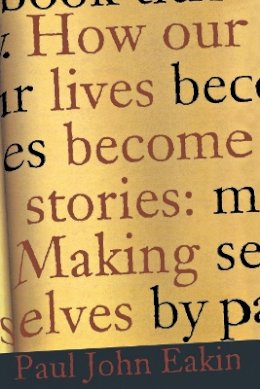
How Our Lives Become Stories: Making Selves
Paul John Eakin
The popularity of such books as Frank McCourt's Angela's Ashes, Mary Karr's The Liars' Club, and Kathryn Harrison's controversial The Kiss, has led columnists to call ours "the age of memoir." And while some critics have derided the explosion of memoir as exhibitionistic and self-aggrandizing, literary theorists are now beginning to look seriously at this profusion of autobiographical literature. Informed by literary, scientific, and experiential concerns, How Our Lives Become Stories enhances knowledge of the complex forces that shape identity, and confronts the equally complex problems that arise when we write about who we think we are.
Using life writings as examples—including works by Christa Wolf, Art Spiegelman, Oliver Sacks, Henry Louis Gates, Melanie Thernstrom, and Philip Roth—Paul John Eakin draws on the latest research in neurology, cognitive science, memory studies, developmental psychology, and related fields to rethink the very nature of self-representation. After showing how the experience of living in one's body shapes one's identity, he explores relational and narrative modes of being, emphasizing social sources of identity, and demonstrating that the self and the story of the self are constantly evolving in relation to others. Eakin concludes by engaging the ethical issues raised by the conflict between the authorial impulse to life writing and a traditional, privacy-based ethics that such writings often violate.
Product Details
About Paul John Eakin
Reviews for How Our Lives Become Stories: Making Selves
Canadian Literature
In this intriguing book, Paul John Eakin problematizes the notion of autobiography as 'the story of the self' and argues that in the act of narration one is engaged in a process of making a self.... How Our Lives Become Stories is a concise and engaging synopsis of the state of the art for anyone interested in the subject.
Modern Fiction Studies
This fascinating new book... offers an engaging introduction to identity and narrative.... This is a well-written, timely, and progressive book—a surprisingly rare mix.
Virginia Quarterly Review
When we write about our lives, the complex work of constructing the story is intertwined with all that constitutes the process of identity formation. In this book, Eakin expertly guides us through the thorny terrain of research in neurology, developmental psychology, and memory theory and revisits philosophy and literary theory. By the end of the journey, we have a far richer understanding of how individuals construct their lives and how they tell the story of that construction, as well as a sense of the dynamic interplay between the two processes.
Literature and Medicine
